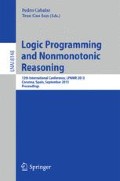Abstract
Combinatory Categorial Grammar (CCG) is a grammar formalism used for natural language parsing. CCG assigns structured lexical categories to words and uses a small set of combinatory rules to combine these categories in order to parse sentences. In this work we describe and implement a new approach to CCG parsing that relies on Answer Set Programming (ASP) — a declarative programming paradigm.Different from previous work, we present an encoding that is inspired by the algorithm due to Cocke, Younger, and Kasami (CYK). We also show encoding extensions for parse tree normalization and best-effort parsing and outline possible future extensions which are possible due to the usage of ASP as computational mechanism. We analyze performance of our approach on a part of the Brown corpus and discuss lessons learned during experiments with the ASP tools dlv, gringo, and clasp. The new approach is available in the open source CCG parsing toolkit AspCcgTk which uses the C&C supertagger as a preprocessor to achieve wide-coverage natural language parsing.
Access this chapter
Tax calculation will be finalised at checkout
Purchases are for personal use only
Preview
Unable to display preview. Download preview PDF.
References
Alviano, M., Faber, W., Greco, G., Leone, N.: Magic sets for disjunctive datalog programs. Tech. rep., Università della Calabria, Dipartimento di Matematica (2009)
Baker, C.F., Fillmore, C.J., Lowe, J.B.: The Berkeley FrameNet Project. In: 36th Annual Meeting of the Association for Computational Linguistics and 17th International Conference on Computational Linguistics, pp. 86–90 (1998)
Baral, C.: Knowledge Representation, Reasoning, and Declarative Problem Solving. Cambridge University Press (2003)
Beavers, J.: Documentation: A CCG implementation for the LKB. Tech. rep., Stanford University, Center for the Study of Language and Information (2003)
Beavers, J.: Type-inheritance combinatory categorial grammar. In: International Conference on Computational Linguistics, COLING 2004 (2004)
Bos, J.: Wide-coverage semantic analysis with boxer. In: Semantics in Text Processing, STEP, pp. 277–286. College Publications (2008)
Brewka, G., Eiter, T., Truszczynski, M.: Answer set programming at a glance. Commun. ACM 54(12), 92–103 (2011)
Calimeri, F., Faber, W., Gebser, M., Ianni, G., Kaminski, R., Krennwallner, T., Leone, N., Ricca, F., Schaub, T.: ASP-Core-2 input language format (2012)
Clark, S., Curran, J.R.: Log-linear models for wide-coverage CCG parsing. In: SIGDAT Conference on Empirical Methods in Natural Language Processing, EMNLP 2003 (2003)
Clark, S., Curran, J.R.: Parsing the WSJ using CCG and log-linear models. In: 42nd Annual Meeting of the Association for Computational Linguistics, ACL, pp. 104–111 (2004)
Clark, S., Curran, J.R.: Wide-coverage efficient statistical parsing with CCG and log-linear models. Computational Linguistics 33(4), 493–552 (2007)
Cocke, J., Schwartz, J.T.: Programming Languages and Their Compilers. Courant Institute of Mathematical Sciences, New York (1970)
Djordjevic, B., Curran, J.R.: Efficient combinatory categorial grammar parsing. In: Proceedings of the 2006 Australasian Language Technology Workshop, ALTW, pp. 3–10 (2006)
Drescher, C., Walsh, T.: Modelling grammar constraints with answer set programming. In: International Conference on Logic Programming, vol. 11, pp. 28–39 (2011)
Eisner, J.: Efficient normal-form parsing for combinatory categorial grammar. In: 34th Annual Meeting of the Association for Computational Linguistics, pp. 79–86. ACL (1996)
Francis, W.N., Kucera, H.: Brown corpus manual. Letters to the Editor 5(2), 7 (1979)
Gebser, M., Kaufmann, B., Neumann, A., Schaub, T.: Conflict-driven answer set solving. In: International Joint Conference on Artificial Intelligence, pp. 386–392 (2007)
Gelfond, M., Lifschitz, V.: The stable model semantics for logic programming. In: Proc. International Logic Programming Conference and Symposium, ICLP, pp. 1070–1080 (1988)
Kasami, T.: An efficient recognition and syntax analysis algorithm for context-free languages. Tech. Rep. AFCRL-65-758, Air Force Cambridge Research Laboratory (1965)
Katsirelos, G., Narodytska, N., Walsh, T.: Reformulating global grammar constraints. In: van Hoeve, W.-J., Hooker, J.N. (eds.) CPAIOR 2009. LNCS, vol. 5547, pp. 132–147. Springer, Heidelberg (2009)
Lange, M., Leiß, H.: To CNF or not to CNF? An efficient yet presentable version of the CYK algorithm. In: Informatica Didactica 8. Universität Potsdam (2009)
Lierler, Y., Schüller, P.: Parsing Combinatory Categorial Grammar via planning in Answer Set Programming. In: Erdem, E., Lee, J., Lierler, Y., Pearce, D. (eds.) Correct Reasoning. LNCS, vol. 7265, pp. 436–453. Springer, Heidelberg (2012)
Lierler, Y., Schüller, P.: Towards a tight integration of syntactic parsing with semantic disambiguation by means of declarative programming. In: Erk, K., Koller, A. (eds.) 10th International Conference on Computational Semantics (2013)
Lifschitz, V.: Answer set programming and plan generation. Artif. Intel. 138, 39–54 (2002)
Marek, V., Truszczyński, M.: Stable models and an alternative logic programming paradigm. In: The Logic Programming Paradigm: A 25-Year Perspective, pp. 375–398. Springer (1999)
Moot, R.: Proof Nets for Linguistic Analysis. Ph.D. thesis, Utrecht Institute of Linguistics OTS (2002)
Niemelä, I.: Logic programs with stable model semantics as a constraint programming paradigm. Annals of Mathematics and Artificial Intelligence 25, 241–273 (1999)
Quimper, C.-G., Walsh, T.: Decomposing global grammar constraints. In: Bessière, C. (ed.) CP 2007. LNCS, vol. 4741, pp. 590–604. Springer, Heidelberg (2007)
Steedman, M.: The syntactic process. MIT Press, London (2000)
Vijay-Shanker, K., Weir, D.J.: Polynomial time parsing of combinatory categorial grammars. In: 28th Annual Meeting of the Association for Computational Linguistics, pp. 1–8 (1990)
White, M., Baldridge, J.: Adapting chart realization to CCG. In: European Workshop on Natural Language Generation, EWNLG 2003 (2003)
Wittenburg, K.: Predictive combinators: a method for efficient processing of combinatory categorial grammars. In: 25th Annual Meeting of the Association for Computational Linguistics, ACL, pp. 73–80 (1987)
Younger, D.H.: Recognition and parsing of context-free languages in time n 3. Information and Control 10(2), 189–208 (1967)
Author information
Authors and Affiliations
Editor information
Editors and Affiliations
Rights and permissions
Copyright information
© 2013 Springer-Verlag Berlin Heidelberg
About this paper
Cite this paper
Schüller, P. (2013). Flexible Combinatory Categorial Grammar Parsing Using the CYK Algorithm and Answer Set Programming. In: Cabalar, P., Son, T.C. (eds) Logic Programming and Nonmonotonic Reasoning. LPNMR 2013. Lecture Notes in Computer Science(), vol 8148. Springer, Berlin, Heidelberg. https://doi.org/10.1007/978-3-642-40564-8_49
Download citation
DOI: https://doi.org/10.1007/978-3-642-40564-8_49
Publisher Name: Springer, Berlin, Heidelberg
Print ISBN: 978-3-642-40563-1
Online ISBN: 978-3-642-40564-8
eBook Packages: Computer ScienceComputer Science (R0)

